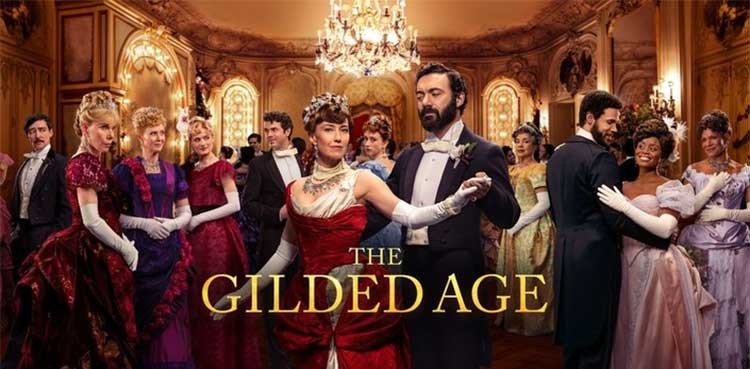In a dramatic turn for The Gilded Age Season 3, Episode 5, tensions flare within the Russell family and beyond, delivering some of the season’s most gripping moments. George Russell, typically unflappable, is unraveling under mounting pressures, while Bertha faces his wrath and societal maneuvering. Meanwhile, Gladys struggles abroad, and Peggy navigates complex relationships, making this episode a standout in an otherwise slow season.
The Gilded Age- Updates, News and More!
George Russell’s frustration peaks as his ambition to dominate the railroad industry falters. He fires his loyal but ineffective aide, Clay, for failing to secure critical railway lines, blaming him for the shortfall despite George’s own financial overreach—partly due to the hefty dowry paid for Gladys’s marriage to the Duke of Buckingham. In a bold move, George assigns his son, Larry, to negotiate land deals in Arizona. Larry, however, is distracted by his sudden proposal to Marian, which thrills George but infuriates Bertha, who sees Marian as an unsuitable match for their family’s social aspirations. Adding to the drama, Larry spots Maud Beaton, a former con artist, now posing as Dolly Trent in New York’s seedy Haymarket, hinting at a scandalous twist.
Bertha’s social scheming takes center stage as she navigates high society’s shifting dynamics. Divorce becomes a recurring theme, with Aurora Fane ostracized by Mrs. Astor’s circle and Mrs. Astor’s daughter, Charlotte, facing her own marital split. At a Newport party hosted by the enigmatic Mamie Fish, Bertha manipulates a situation involving Aurora’s social exile to sideline Marian, her potential daughter-in-law, while appearing sympathetic. Mamie, a power player unbound by old-money rules, challenges Mrs. Astor’s hypocrisy, pointing out her inconsistent stance on divorce given her daughter’s situation.
‘The Gilded Age Wedding Scene: Who designed the Gown?
Across the Atlantic, Gladys Russell endures misery at Sidmouth Castle. The Duke’s domineering sister, Sarah, makes her feel unwelcome, criticizing her appearance and firing her beloved maid, Adelhide. Sarah’s cold justification—that she knows better how things are managed in England—underscores the transactional nature of Gladys’s marriage, orchestrated to save the Duke’s family with her dowry. Gladys’s desperate letter to her parents reveals her despair, fueling George’s guilt and anger toward Bertha, whom he blames for their daughter’s plight.
Back in New York, Peggy faces her own challenges. She’s courted by Dr. Kirkland, but his elitist mother disapproves of her family. Complicating matters, Peggy’s former editor and crush, T. Thomas Fortune, reenters her life, offering a career-defining chance to interview suffragist Frances Ellen Watkins Harper in Philadelphia. Their past kiss creates tension, escalating when Fortune confronts Kirkland at the train station, leading to a physical altercation. Peggy, determined to maintain professionalism, refuses to travel with Fortune but promises to explain the situation to Kirkland later.
The episode’s emotional core is George and Bertha’s crumbling partnership. George, reeling from business setbacks and Gladys’s misery, accuses Bertha of undermining him, particularly after she flirts with railroad magnate Alfred Merrick at a dinner to aid George’s deal. When Merrick rejects George’s offer, George lashes out, feeling humiliated and questioning Bertha’s loyalty. His anger peaks upon receiving Gladys’s letter, leading to a chilling ultimatum: he may not be there when Bertha returns from fixing things in England. Bertha, usually manipulative and composed, is left vulnerable, pleading to salvage their marriage.
This episode, rich with betrayal, ambition, and social intrigue, marks a turning point, setting the stage for high-stakes consequences as the Russells’ empire and marriage teeter on the edge.


Leave a Comment